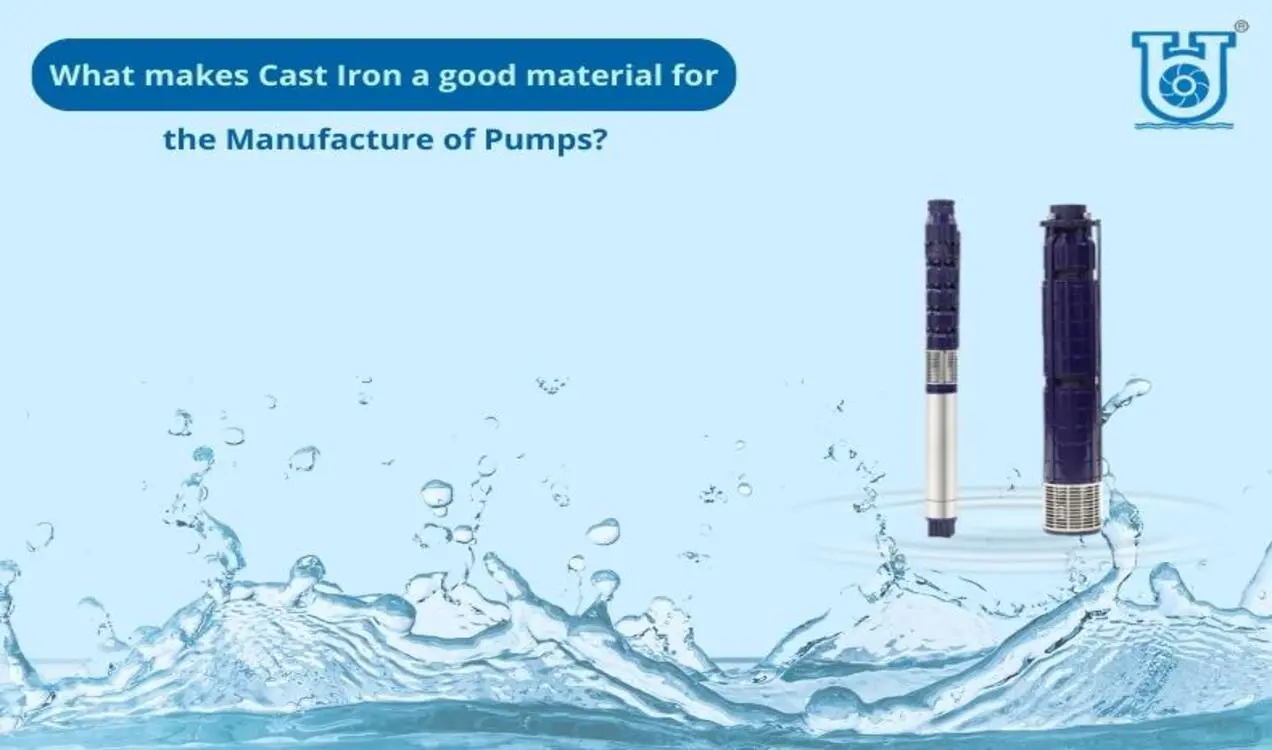Cast iron is a hard and brittle alloy of iron that includes a significant quantity of carbon (usually 2-4%). It is recognised for its great strength and durability, making it a preferred material in several sectors, including pump manufacture.
Pumps are mechanical devices intended to transport fluids from one location to another. They serve a key role in several applications, such as water supply, sewage systems, industrial operations, and agriculture. Pumps are critical for maintaining appropriate fluid flow, facilitating essential activities and guaranteeing the effective functioning of numerous systems.
Properties of Cast Iron:
One of the primary reasons cast iron is used for pump construction is its amazing combination of qualities.
Strength and durability:
Cast iron is noted for its great strength, making it capable of withstanding tremendous pressure and mechanical stress. It can endure the harsh circumstances typically found in pump applications, guaranteeing a long operating life.
Heat resistance:
Pumps commonly operate with fluids that create heat, and cast iron’s heat resistance is a key feature in such cases. It can resist high temperatures without deforming or losing its structural integrity.
Corrosion resistance:
Pumps are exposed to numerous corrosive substances, including chemicals and water. Cast iron demonstrates great resistance to corrosion, minimising early wear and sustaining the pump’s performance over time.
Machinability:
The machinability of cast iron enables for fine shape and forming of pump components throughout the production process. This assures exact measurements, tight tolerances, and overall high-quality output.
Manufacturing Process of Cast Iron Pumps:
The production process plays a significant role in leveraging the advantages of cast iron for pumps.
Casting process:
The manufacture of cast iron pumps starts with the casting process. In this step, cast iron is melted and poured into moulds that have the required form and design of the pump components. The molten cast iron solidifies within the moulds, creating the raw pump pieces. This casting method allows for the fabrication of complicated forms and fine features, assuring the best performance of the pump.
Machining and finishing:
After the casting process, the raw pump components undergo machining and finishing procedures. Machining includes eliminating superfluous material and shaping the components to obtain the appropriate dimensions and tolerances. This method guarantees precise and accurate pump components. Finishing processes such as polishing and surface treatment are then conducted to improve the appearance and smoothness of the pump components. These last touches add to the overall quality and functionality of the cast iron pumps.
Advantages of Cast Iron in Pump Manufacturing:
The use of cast iron in pump manufacture provides numerous noticeable benefits.
Cost-effectiveness:
Cast iron is a cost-effective material compared to numerous alternatives. Its availability and relatively cheap manufacturing costs make it a desirable alternative for producers, enabling economical pump production.
Versatility:
Cast iron’s adaptability permits its employment in numerous pump types and sizes. It can tolerate varying flow rates, pressures, and fluid types, making it suited for a broad variety of pumping applications.
Longevity:
Cast iron pumps are noted for their robustness and extended service life. The material’s durability, along with adequate maintenance, guarantees that pumps manufactured of cast iron can resist tough working circumstances for lengthy durations.
Applications of Cast Iron Pumps:
Cast iron pumps find use in several industries and areas.
Water and sewage systems:
Cast iron pumps are widely employed in water and sewage systems. Their corrosion resistance and capacity to withstand high amounts of water make them excellent for these applications.
Industrial processes:
Many industrial operations need pumps to transfer liquids, chemicals, and other fluids. Cast iron pumps thrive in these conditions, due to their strength, heat resistance, and chemical compatibility.
Agricultural applications:
In agricultural contexts, pumps are utilised for irrigation, drainage, and numerous farming activities. Cast iron pumps offer the essential dependability and performance needed for these demanding agricultural applications.
Maintenance and Care of Cast Iron Pumps:
To maintain the lifetime and best performance of cast iron pumps, adequate maintenance and care are needed.
Regular cleaning and inspection:
Periodic cleaning and examination of cast iron pumps assist uncover any possible difficulties such as debris collection or symptoms of corrosion. This enables prompt repair and eliminates expensive damage or downtime.
Lubrication:
Applying proper lubricants to moving components decreases friction and wear, increasing the pump’s lifetime. Regular maintenance guarantees smooth functioning and minimises excessive strain on the pump.
Protection against corrosion:
Although cast iron is corrosion-resistant, further preventative measures may be performed to extend its life. Coatings or paint systems may give an additional layer of protection from external corrosive chemicals.
Conclusion:
Cast iron’s particular qualities, cost-effectiveness, and adaptability make it a good material option for the construction of pumps. Its strength, heat resistance, corrosion resistance, and machinability help the manufacturing of robust and dependable pump components. Cast iron pumps have extensive use in water systems, industrial operations, and agriculture, responding to varied pumping demands.
By following correct maintenance methods, including frequent cleaning, lubrication, and corrosion prevention, the lifetime and performance of cast iron pumps may be enhanced. As we continue to depend on pumps for several critical jobs, cast iron will surely remain a basic element in pump manufacture for years to come.


